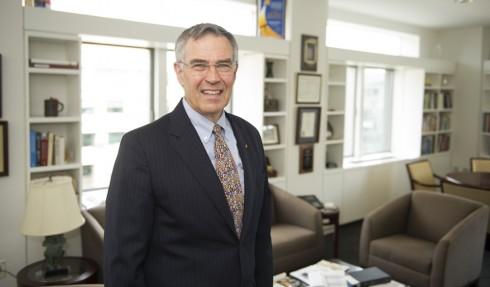Should scientists play a role in shaping global policy?
Rush Holt, a former congressman who also was a plasma scientist, says scientists have an obligation to speak out on important issues in which public policy is informed by scientific evidence.
Albert Einstein knew scientists must be involved in determining domestic and global policy.
When he wrote a letter to President Roosevelt warning him about Nazi Germany developing the atomic bomb, he also wrote, “Those with the privilege to know have the duty to act.”
Fast forward to this year: sitting next to Secretary of State John Kerry as he hashed out a nuclear deal with Iran was Energy Secretary Ernest Moniz, a nuclear physicist and former MIT prof. The terms of the final deal were spelled out during a face-to-face meeting between Moniz and another scientist, Ali Akbar Salehi, the head of the Iranian Atomic Energy Organization.
More recently, as President Obama faced congressional opposition to the Iran deal, a group of 29 scientists, signed a public letter backing the proposal, calling it "innovative and stringent."
Rush Holt, a former congressional representative from New Jersey's 12th district who was also a plasma physicist, was one of the scientists who signed that letter. He believes scientists have an obligation to speak out and contribute to the debate on important issues.
“It is a privilege to be a scientist; it’s an exciting path of discovery,” Holt says. “But there are some obligations that come with it, [including] obligations to make sure that the science is used for the public good. That means, in part, communicating with the public about the science.”
In the case of the Iran nuclear agreement, Holt, who is now C.E.O. of the American Association for the Advancement of Science, says he and other scientists with backgrounds in nuclear weapons technology and proliferation came to the conclusion that the deal made sense.
“As we said in the letter, there are a number of innovations,” Holt says. “It's really quite a strong, maybe even the strongest, agreement of this kind we’ve seen. So we thought we ought to put that down in writing for the president and and release it to the public.”
As a congressman, Holt says, he had a rule of thumb, which was, Never overestimate the knowledge of the public and never underestimate their wisdom.
“Scientists should not presume to claim to have better value judgments, to have a better sense of democratic values, than non-scientist citizens,” Holt explains, “but we can teach the principles, as well as the excitement and the beauty of the science, and we can help them understand the key points that go into making the political, social and value judgments.”
Holt acknowledges that this can be difficult. Right now, for example, Congress is dominated by conservatives with an anti-science bent who nevertheless control the budget for the National Science Foundation. Saying, ‘I’m not a scientist’ has become a familiar political response to questions about controversial scientific issues.
“We have to get the American public away from this point of view,” Holt insists, “whether it's about climate change, vaccination or teaching biology in high schools…[T]he practice of science is a way of refining our thinking to get to a progressively better and better understanding of the world. It's a self-correcting system and it's a process."
“An awful lot that goes on on Capitol Hill right now is [driven by] ideology and often in an evidence-free way,” Holt continues. “So it’s a challenge for scientists to point out the power of following the evidence, of evaluating the evidence — and teaching people that ordinary folks can evaluate evidence, too.”
“Right now the most ideological debate is about climate change,” Holt says, “Before any discussion starts, people have already drawn up sides. And they try to say, ‘We have more scientists on our side than you do,’ as if this is a vote by scientists. It’s not. It’s about how scientists evaluate the evidence and how you, as an informed and concerned citizen, can evaluate that evidence, rather than just assert again and again which side you're on.”
The point is not to approach these conflicts in a confrontational way, but to show where the evidence leads, Holt says.
“If the other person or group is wedded to their ideology, then approaching them confrontationally will only drive them deeper into their ideology,” Holt maintains. “The creative teachers and scientists can help people understand that it's the evidence that can give you meaning, not your preconceptions.”
This article is based on an interview that aired on PRI's Science Friday with Ira Flatow
Our coverage reaches millions each week, but only a small fraction of listeners contribute to sustain our program. We still need 224 more people to donate $100 or $10/monthly to unlock our $67,000 match. Will you help us get there today?
